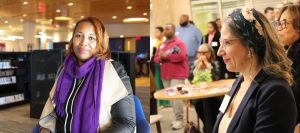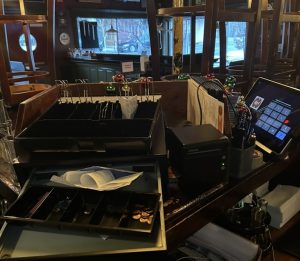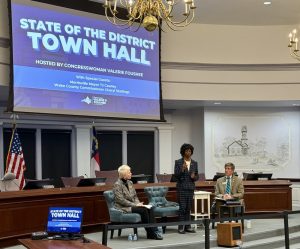On a warm evening earlier this week, the aroma of freshly baked pizza greeted those who trickled into the Hi-Wire Brewery and lined up at the bar. Families congregated as children ran off to the indoor play area, with its soccer balls and faux grass. A couple played ping-pong while grasping their half-empty beers, their leashed dog sporting a green tutu.
But despite appearances, this was no typical evening at the Hi-Wire Brewery. A group called Solar CrowdSource was betting that slices and beer would help them spread the gospel of clean energy and encourage local residents and business owners to invest in solar.
About 80 people had signed up for the Solarize the Triangle 2023 Program Kickoff, organized by the Triangle J Council of Governments and representatives of Solar CrowdSource, which promotes solar energy. Partnering with the Solarize the Triangle campaign is Yes Solar Solutions, the program’s sole installer.
Launched last year, the campaign aims to attract customers through a group buying process that lowers the price for consumers as more people join. Property owners from the 12 Triangle communities (Durham County, the City of Durham, Chatham County, Raleigh, Cary, Chapel Hill, Hillsborough, Carrboro, Apex, Morrisville, Orange County, Holly Springs) are eligible.
Solarize the Triangle is helping Durham inch toward its goal to increase renewable energy in the city to 80% by 2030. As of August 2022, there were 1,500 solar energy systems throughout Durham County. Now, there are 1,546.
The program uses an eight-tier bulk pricing model. The first is the most expensive and has the fewest participants; the eighth has attracted the most users and thus boasts the cheapest unit prices. As participants join each tier, they pay less for their energy.
(Along with initiatives such as Solarize the Triangle, solar energy users–thanks to the Inflation Reduction Act of 2022–can now take a 30 percent tax credit. They may also receive a state rebate, a personal tax credit, and loans.)
More attendees shuffled in as 6:30 approached, most stopping at the pizza-covered table to grab a slice before joining their peers at one of the long wooden picnic-style tables. A slideshow, prepared by Solar CrowdSource, played on a loop in the near distance. It touted a total of $300,500 in annual utility bill savings for program participants and $5.98 million in new clean energy development in the Triangle.
A few people glanced at the screen, but never for more than a few seconds. But one man sat alone, chewing his pizza slowly as he analyzed the numbers on the screen.
Morrisville resident Sri, who calls himself an environmentalist and declined to give his full name, attended 2022’s Solarize the Triangle kick-off event at the North Carolina Museum of Art. Last year, he decided not to buy into the program, but he’s drawn in by this year’s lower costs. “This year, I’m going to get more invested,” he said between bites.
At 6:35, Durham Sustainability Manager Tobin Freid took the mic and explained the benefits of the program and the economic efficiency of group bundling.
“There is no harm in being the first one in,” she said, noting that customers are eligible for a rebate no matter how much they initially pay–as long as more people buy in and the price of solar declines.
Next up was Triangle J Council of Governments representative Emily Barrett. She announced that collective funding for last year’s low-moderate income program totaled $420,000. This program uses a portion of Solarize the Triangle’s campaign proceeds to provide solar energy for a selected local nonprofit and for several low-to-moderate income family homes. The crowd applauded.
As the speeches continued, technicians and sales reps outside awaited the brigade of attendees about to flood the porch seeking a free assessment. Finally, Don Moreland, Solar CrowdSource’s founder, took the mic. After a few words, he invited questions from the audience.
“What is the critical timeline of the program?” a woman bellowed from the second-to-last table, her voice barely detectable over clattering metal trays of pizza and the barking of the dog in the tutu.
Freid responded that attendees and residents can register for a free assessment by September 30th, 2023, and have until December 31st to sign installment contracts for personal properties. For commercial and non-profit properties, contracts are due by March 31st, 2024.
“What about historic neighborhoods’ certificates of appropriateness?” another audience member asked.
Freid explained that the North Carolina Supreme Court ruled last June that Homeowners Associations cannot regulate or move solar panels unless doing so does not prevent their “reasonable use.”
In Durham County, certificates of appropriateness are not needed “so long as [solar panels are] not attached to a character defining roofing material (e.g., slate, terra cotta, traditional standing seam metal)” and the property “meets normal maintenance criteria,” according to the Durham City-County Planning Department. Further restrictions and review apply for properties that do not meet this criteria.
The Q&A formally ended, and attendees made their way to the patio to ask the sales reps more questions. By the time the crowd was outside, Sri was already deep in conversation across the table with a sales rep about his options for solar panel installation at home.
Investing in solar energy offers several advantages, explained Tom Keller, a Yes Solar sales rep. One is that it’s good for the environment. But many potential customers were considering it for other reasons. One attendee, for example, inquired about potential financial gains of using solar energy on rental properties. Others were considering solar as a business investment.
At 7:29, after about 30 minutes of consultation, Sri was now sitting on the same side as his sales rep, staring at a computer screen and nodding. Another sales rep joined the conversation and sat across from the pair as Sri signed up for the free assessment.
Audrey Patterson








